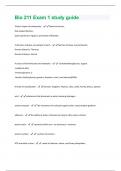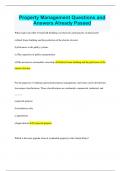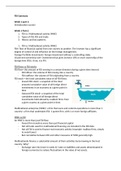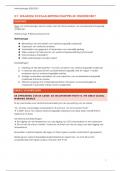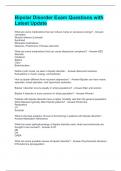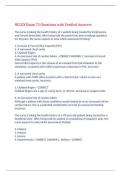Week 1 – 4 September 2017
Definition of national thought
• “humankind is naturally divided into cultural communities called nations”
• “one’s primary political loyalty is towards one’s nation”
• “national concord is the state’s strongest foundation”
• “a state containing various nations is weak”
• “a nation divided over different states is unnatural”
Map of Europe before the unification of Germany (1870-1871)
o Nation means to be born somewhere (like in a family or tribe).
o In the French revolution, the common people decided for the first time what being a
nation really meant, instead of the aristocrats.
o European nation building is unique due to the focus on culture. This means that
European nation building is different from African and Asian nations.
o Democracy is in danger when there is no room for diversity.
o France does not recognize minorities. Everybody has to be French and speak the
language. After the French revolution, they said that the country had to be unified.
o A nation is nothing else than the will of the people.
1
,Nationalism
• “there should be a 1-on-1 congruence between nation and state:
▪ 1 state for each nation, 1 nation for each state”
• “state borders should be mapped onto cultural (ethnolinguistic) frontiers”
• “ethnic conflict is to be solved by territorial division”
o The European Union should have been the solution to border conflicts within the
European continent, however, this is now under pressure.
o A state is a political geographical unity, that has the right to use violence legitimately
against its own citizens.
o A nation are the people living in a state (mostly), who identify themselves through
culture as a group.
19th century consequences
A single cultural community divided over various states:
• The divided nation attempts to unite.
A single state containing various cultural communities:
• (scenario 1) The state attempts to “tame” cultural diversity (centralism).
• (scenario 2) The state’s control is challenged (separatism).
Borders and frontiers
State borders:
- Sharp demarcations
- Reflect changeable power relations
Cultural frontiers:
- Transitional zones
- Reflect transgenerational private lifestyles
Centuries overview
• Middle Ages (800-1400):
Feudal “states”; cultural differences are noticed but cultural identities are only politically
forceful in cities.
• Early-Modern period (1400-1700):
Kings vs. nobility: absolutist centralization and state-formation. Wars of religion. First
systematizations of ideas about “national character”.
• Enlightenment (18th century):
Rise of democratic republicanism. The “nation” becomes a constitutional principle.
2
, • Romanticism (1770-1840):
The nation becomes a culture-anthropological principle. Widespread resistance against
Napoleon.
• 19th century (1815-1918):
Europe as a composite territory of different cultures. National movements. The nation
becomes an ethnic-racial principle.
• Short 20th century (1919-1989):
Totalitarianism, decolonization, transnationalism.
• 21st century (1989-):
Identity wars, clash of civilization, ethnopopulism.
Forms of Identity
• Until the 19th century – emotional bonds with:
1) family, clan, tribe;
2) city;
3) country of birth;
4) religion;
5) social class;
• From the 19th century – nation
• 20th century – Eastern or Western Europe
• Late 20th century – today – national, European, global citizens
• Usually overlapping levels of identity
What is Europe?
• “United in diversity”
• a term with a long history;
- geography – a continent;
- idea – a cultural unit with its own values and cultural conventions;
- Political unit – European Union; balance of power on the continent
• Usually identified with:
- Liberty
- Christianity/Christendom
- Civilization
Historical layers of the term Europe
• The idea of Europe – historian as archeologist of ideas and cultural assumptions about
the name.
• Europe has been associated with:
- Political freedom – ancient Greece, 5th century BC.
- Christendom – 15th century (Reconquista).
3
, - Civilization – 18th century Enlightenment.
- Progress and imperialism – 19th century.
- Aggressive nationalism – 1848.
Europe in Mythology
• Europa – in Greek mythology is the daughter of a Phoenician king. (Lebanon, Jordan,
Palestine, Israel, Syria = Levant).
• Zeus, the supreme God of the ancient Greeks, falls in love with her and transforms
himself into a bull while she and her friends are playing on the beach.
• Europa strokes the bull and sits on his back, and Zeus gallops into the sea and swims to
Crete taking Europa with it.
• In Crete Zeus assumes human form and begets three sons by Europa.
• “Abduction of Europa” – a popular theme in literature and the visual arts during the
classical period.
o Europe is a venetian princess, abducted by Zeus.
Rembrandt, The Abduction of Europa, 1632
Europe – Etymology
• Tripartite view – the division of the world in three distinct continents
• Asia, Africa, Europe
4


